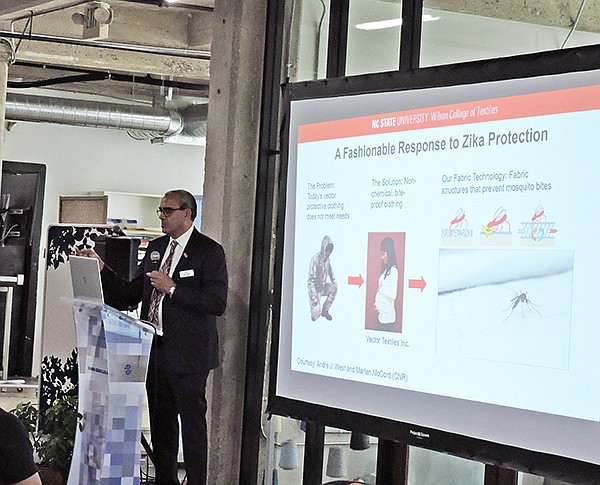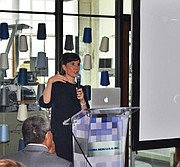In Los Angeles, Shima Seiki Seeks to ‘Knitify the World’
Technology
Andre West of the Zeis Textile Extension program at North Carolina State University’s Wilson College of Textiles
As of Thursday, October 31, 2019
Within its new space, which opened in March, Japanese machine manufacturer Shima Seiki hosted its second G3D seminar in its fresh showroom. The first event in the Arts District space was held earlier this year, focused on a “Yarn to Shelf” manufacturing approach to apparel, while the recent session, hosted Oct. 23 and 24, adhered to the theme “Knitify the World.”
“This time we wanted to focus on our theme ‘Knitify the World,’ which we announced at the International Textile Machinery Association in Barcelona earlier this year,” Sales and Senior Business Development Manager Hayato Nishi explained. “We wanted to recap that in our L.A. showroom for the U.S. customers who couldn’t make it to Barcelona. Before, we were focusing more on apparel brands, but this time we had more research and development and yarn mills.”
While many people perceive knitting to simply be related to sweaters, Shima Seiki has been focused on showcasing the ways in which knit practices can be applied to a variety of apparel items, including safety apparel and footwear, but also across other industries including architecture.
Not resting on their laurels, the company’s event organizers are already planning for a spring 2020 event and noted that interest in sustainability continues to grow with each meeting as more emerging brands and industry leaders are adopting greener practices. This trend became apparent as speakers and attendees during this recent event shared information to improve manufacturing.
“Our G3D seminars are a little more casual and broken down so we can have these in-depth sessions and networking times to interact and become one Shima family, sharing Shima stories to gain real-life perspective to plug into their next development or become inspired for a new business endeavor,” Nishi said. “We want to lower the barrier to entry to this knitting industry.”
One of those attendees was Stevan Stephan, a Los Angeles Trade-Technical College graduate who was interested in haute couture but left the industry behind 10 years ago. For Stephan, the event served as an opportunity to consider returning to the industry as he listened to presentations from industry experts such as String Theory’s Lysanne Latulippe and Parkdale Mills’ Cheryl Smyre.
“I have an idea and am trying to meet a manufacturer to produce in limited quantities,” Stephan said. “It’s more about integrating cultural and folkloric patterns into a garment to make it more interesting but more wearable. Before, I was more interested in men’s clothing, but a lot of women’s clothing, particularly knits, are more interesting.”
During her presentation “String Theory: Sustainabilty in Knitwear,” Latulippe discussed creating classic pieces through quality craftwork, materials and more-efficient manufacturing. A knitter for the last 20 years, Latulippe founded String Theory 10 years ago with a focus on creating patterned textiles such as those used in her Supersymmetry scarf design. The product is a sharable single scarf that can be split into two for sharing between two people.
“With more growth in sustainability, it’s about knitting on demand. We are not doing mass production. I knit what I need and don’t waste a lot of yarn. With the whole-garment technology I really don’t cut any fabrics,” she said. “With the Supersymmetry project, it’s about bringing meaning to a product. You can customize the pattern on it and share it with someone you love.”
By agreeing to speak at the Shima Seiki event, Latulippe felt that she was able to connect with others who are passionate about textile and apparel. Through sharing information, attendees and speakers could inform and learn from each other regarding solutions to reduce waste.
“The focus for the sustainability was about less is more. You don’t really need to buy all these things,” she said. “If there is cotton waste created from my cotton yarn, it is sent to a lady who transforms it into paper. If there is enough, I have it sent back and I can wrap scarves in my own paper or write these notes to my customers.”
Attendee Terrica Preston agrees and was interested in exploring how her peers are adopting eco-friendlier practices. As a tailor at Levi’s Tailor Shop, Preston is pursuing higher education at Los Angeles’ Fashion Institute of Design & Merchandising to achieve her goal of becoming an environmentally friendly textile designer. In addition to the sustainable sessions from the first day, she was also pleased with the presentation from Andre West, the director of the Zeis Textile Extension program at North Carolina State University’s Wilson College of Textiles.
“In Los Angeles, fashion connoisseurs need to see that there is more that we can do to reduce waste. We waste so much. With this area so close to Skid Row, you can see so many garments on the ground. Stop the waste going to landfills,” she said. “Involvement is key, and there is a lot of knowledge here. They brought good speakers who had a lot of information to share.”

